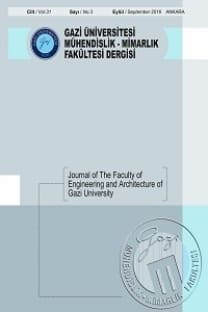Kısa dönem elektrik talep tahminleri için yapay sinir ağları ve uzman sistemler tabanlı hibrit sistem geliştirilmesi
Development of a hybrid system based on neural networks and expert systems for shortterm electricity demand forecasting
___
- 1. Liu N., Babushkin V., Afshari A., Short-Term Forecasting of Temperature Driven Electricity Load Using Time Series and Neural Network Model, Journal of Clean Energy Technologies, 2 (4), 327-331, 2014
- 2. Ericson T., Short-term electricity demand response, Thesis for the degree doctor ingeniør, Norwegian University of Science and Technology, Faculty of Information Technology, Trondheim, March, 2007.
- 3. Kandananond K., Forecasting Electricity Demand in Thailand with an Artificial Neural Network Approach, Energies 4 (1), 1246-1257, 2011.
- 4. AbuAl-Foul B., Forecasting Energy Demand in Jordan Using Artificial Neural Networks, Topics in Middle Eastern and African Economies, 14 (1), Sept 2012.
- 5. Kheirkhah A., Azadeh A., Saberi M., Azaron A., Shakouri H., Improved Estimation of Electricity Demand Function by Using of Artificial Neural Network, Principal Component Analysis and Data Envelopment Analysis, Computers &Industrial Engineering, 64 (1), 425-441, 2013.
- 6. Assareh E., Behrang M.A., Assareh R., Hedayat N., Integration of Artificial Neural Network and Intelligent optimization techniques on world electricity consumption estimation, World Academy of Science, Engineering and Technology, 73 (1), 2011.
- 7. Chogumaira E.N., Hiyama, T., Short-Term Electricity Price Forecasting Using a Combination of Neural Networks and Fuzzy Inference, Energy and Power Engineering, 3, 9-16, 2011.
- 8. Ozoh P., Abd-Rahman S., Labadin J., Apperley M., A Comparative Analysis of Techniques for Forecasting Electricity Consumption, Int. Journal of Computer Applications, 8(15), 2014.
- 9. Baliyan A., Gaurav K., Mishra S.K., A Review of Short Term Load Forecasting using Artificial Neural Network Models, Int. Conf. on Computer, Communication and Convergence (ICCC2015), 48(1), 121-125, 2015.
- 10. Baziar A., Kavousi-Fard A., Short Term Load Forecasting Using A Hybrid Model Based On Support Vector Regression, Int. Journal of Scıentıfıc & Technology Research, 4 (5), May 2015.
- 11. Es H.A., Kalender F.Y., Hamzaçebi C., Forecasting the net energy demand of Turkey by artificial neural networks, Journal of the Faculty of Engineering and Architecture of Gazi University, 29 (3), 495-504, 2014.
- 12. Soysal A., Akkurt A., Yapay Sinir Ağları ve Türkiye Elektrik Tüketimi Tahmin Modeli, Yüksek Lisans Tezi, İstanbul Teknik Üniversitesi, Fen Bilimleri Enstitüsü, 2005.
- 13. Aslan Y., Yaşar C., Nalbant A.,Electrical Peak Load Forecasting in Kütahya with Artificial Neural Networks, Dumlupınar Üniversitesi, Fen Bilimleri Enstitüsü Dergisi, 11 (1), 2006.
- 14. Enerji Piyasaları İşletme A.Ş. (EPİAŞ), seffaflik.epias.com.tr/transparency/tuketim/tahmin/yuk -tahmin-plani.xhtml
- 15. Philip C., Jackson Jr., Introduction to Artificial Intelligence, Dover Publications, 2. edition, June 1985.
- 16. Samarasinghe S., Neural Networks for Applied Sciences and Engineering: From Fundamentals to Complex Pattern Recognition, Auerbach Publications, First Edition, Sept 2006.
- 17. Otkun Ö., Doğan R.Ö., Akpınar A.S., Neural Network Based Scalar Speed Control of Lınear Permanent Magnet Synchronous Motor, Journal of the Faculty of Engineering and Architecture of Gazi University, 30 (1), 395-404, 2015.
- 18. Giarratan J., Expert Systems: Principles and Programming, Course Technology, 4. Edition, Oct 2004.
- 19. Yurtcu1 Ş., Özocak A., Prediction Of Compression İndex Of Fine-Grained Soils Using Statistical And Artificial İntelligence Methods, Journal of the Faculty of Engineering and Architecture of Gazi University, 31 (3), 597-608, 2016.
- 20. Yük Tevzi Bilgi Sistemi, ytbs.teias.gov.tr
- ISSN: 1300-1884
- Yayın Aralığı: Yılda 4 Sayı
- Başlangıç: 1986
- Yayıncı: Oğuzhan YILMAZ
Utku TÜRKMEN, Ali İbrahim ATILGAN
Karbon elyaf takviyeli karbon nanotüp katkılı epoksi kompozit helisel yayların mekanik davranışları
Berrin BOZAN, Emin Zafer HOŞGÜN
KARBON ELYAF TAKVİYELİ KARBON NANOTÜP KATKILI EPOKSİ KOMPOZİT HELİSEL YAYLARIN MEKANİK DAVRANIŞLARI
KONYA KAPALI HAVZASI’NIN TMPA UYDU KAYNAKLI YAĞIŞ VERİLERİ İLE KURAKLIK ANALİZİ
E-LABORATUVARLAR İÇİN YENİ BİR TASARIM: EŞ ZAMANLI ERİŞİLEBİLEN DENEYSEL UYGULAMA PLATFORMU
ERDAL IRMAK, Ayberk CALPBİNİCİ
Ali İbrahim ATILGAN, Utku TÜRKMEN
Akıllı şebekelerde enerji depolama uygulamalarının önündeki fırsatlar ve karşılaşılan zorluklar
Koray ERHAN, Engin ÖZDEMİR, Ahmet AKTAŞ, Şule ÖZDEMİR
Sıcaklık kontrolü ile polistiren/kil nanokompozit sentezi ve karakterizasyonu
